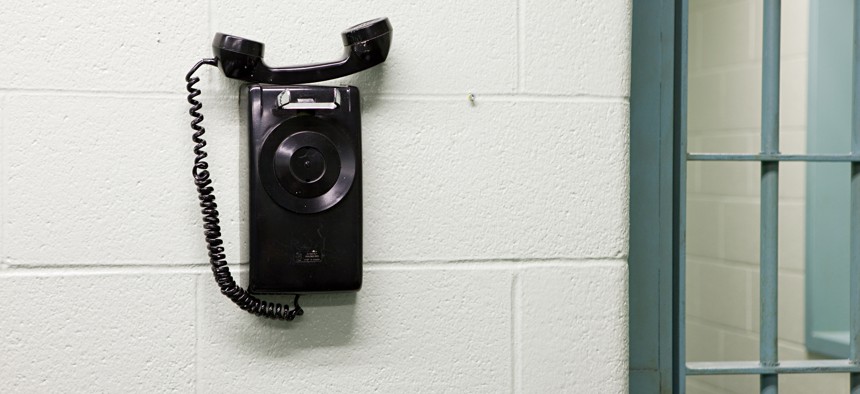Senate Takes Step To Limit Phone Rates For Inmates

Getty Inages
A measure passed unanimously by a committee would require the Federal Communications Commission to set “just and reasonable” prices for calls from jails and prisons. States and localities often collect revenue from the fees.
A Senate committee unanimously passed a bipartisan measure on Tuesday that would require the Federal Communications Commission to bar states and localities from charging inmates exorbitant rates to make phone calls.
The bill still must pass the full Senate and the House. But if approved, the FCC would be required to make sure that prisoners’ phone rates, which can be $25 for a 15-minute call, are “just and reasonable.”
Capping the rates could mean a loss of revenue for some states and localities, which receive a share of the money made by phone companies as part of contracts to provide service in jails or prisons. Critics refer to the commissions as “kickbacks.”
The passage of the bill sponsored by Sen. Tammy Duckworth, a Democrat from Illinois, by the Commerce, Science and Transportation Committee, was a victory for prisoner advocates who have said for years that the high rates disproportionately affect lower-income individuals and people of color, and keep them from being able to stay in touch with families and friends.
Making it more difficult for inmates to maintain relationships while they’re incarcerated could mean they do not get the support they’ll need once they get out, advocates contend.
“It’s just an unjust burden. If they don’t have a solid network of friends and families to help them get back on their feet, they’re in a more vulnerable position,” said Cheryl Leanza, policy advisor to the United Church of Christ.
Efforts to Reduce Rates
Several cities, including New York, in recent years have made phone calls free from jails.
“It’s a fact that incarcerated individuals have a greater chance of rehabilitation when they are in touch with their community. But for too long, our jails charged people for making simple phone calls, which created serious problems for those in our system with limited means,” said then-New York City Council Speaker Corey Johnson, when a measure he sponsored eliminating the charges was signed into law by former Mayor Bill de Blasio in 2018.
The FCC had tried to address the issue under the Obama administration by capping the amount prisons and jails can charge at 11 cents per minute. However, the limit was thrown out by a federal court in 2017, which ruled that the FCC could not regulate the price of calls made within a state.
Duckworth’s bill spells out that the FCC does have the authority.
The bill also had the support of the National Sheriff’s Association. The group’s executive director, Jonathan Thompson, said that by clarifying the FCC’s authority, the bill would prevent the issue of rates from being tied up in the courts. :
“In these tumultuous times, we need some certainty of procedures,” he said. The “legislation has given us a way forward that helps keeps jails and inmates away from the court system and on the phone with loved ones. … Absent of this legislation we fear the continued need for the Courts to be a last resort of reason, and that is totally unsatisfactory.”
The FCC passed new rules last year limiting how much could be charged for making calls to other states at 12 cents per minute for prisons and 14 cents per minute for larger jails, with an average daily population of 1,000 or more.
However, critics say high phone prices have remained a problem, particularly for jail inmates making calls to another part of the same state.
According to the Prison Policy Initiative, states have been lowering costs in prisons, leading to wide differences in prices between prisons and local jails. In Illinois, for instance, the group said city and county jails in 2018 charged an average of $7 for a 15-minute call, 52 times as much as state prisons. A 15-minute intrastate call in Arkansas local jails was $14.49 on average and as much as $24.82 in some facilities.
In a letter to the National Governors Association in 2020, then-FCC chairman Ajit Pai and Brandon Presley, president of the National Association of Regulatory Utility Commissioners, urged local leaders to make calls free for jail inmates, particularly during the pandemic.
Citing FCC data, Pai and Presley said a15-minute call within a state can cost nearly seven times more than calls to other states. Twenty-seven states allow excessive “first-minute” charges for calls within states that are up to 26 times that of the first minute of an interstate call.
“This situation is unacceptable, especially as the overwhelming majority of calls from incarcerated individuals—roughly 80%—are billed as intrastate,” they wrote.
According to a 2017 federal class-action lawsuit challenging phone rates in California county jails, Alameda County received at least $1.5 million from a 70% commission, while Santa Clara County received a 61% commission that resulted in $1.7 million in payments. The counties said the money helped pay to maintain the facilities. The suit was dismissed by a judge in 2018.
And according to Prison Phone Justice, an advocacy campaign, facilities in Michigan received $9.9 million in commissions from phone companies, while those in Arizona received $8.3 million and those in Georgia received $8 million.
Leanza said it’s possible the proposal in Congress, followed by limits set by the FCC, could cost states and localities, though it’s too early to know how much.
Still, Leanza, a former lobbyist for the National League of Cities, said the rates some prisons and jails charge “are not appropriate and they’re not reasonable.”
Kery Murakami is a senior reporter for Route Fifty based in Washington, D.C.
NEXT STORY: The Subtle Psychology of ‘Nudging’ During a Pandemic






